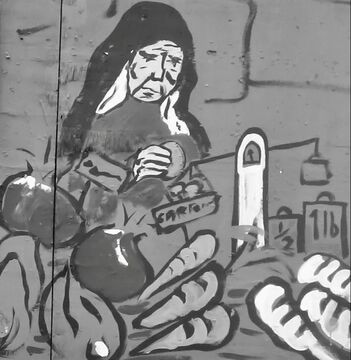The Shawlies: Cork's women street traders and the 'merchant city', 1901–50
“Put simply, it is the story of how official society consistently conspired to make life as hard as possible for women who were already destitute. It is a story of both class and gender.” History Ireland, Nov/Dec. 2017
“...a fascinating aspect of Cork's local history that is probably little known outside Cork city, however, it is much more than that, it is an important social history that may have its parallels in other parts of the State ... highly recommended reading”, Ireland's Genealogical Gazette (2017).
“Local studies, such as Susan Marie Martin's examination of the ‘shawlies’ in Cork, emphasise the potential of microhistories and case studies and the benefit of using local sources to reveal the reality of working-class entrepreneurial activities like street trading in fruit, vegetables and second-hand clothing.” Irish Historical Studies, 46(170), 338-355.
“...a fascinating aspect of Cork's local history that is probably little known outside Cork city, however, it is much more than that, it is an important social history that may have its parallels in other parts of the State ... highly recommended reading”, Ireland's Genealogical Gazette (2017).
“Local studies, such as Susan Marie Martin's examination of the ‘shawlies’ in Cork, emphasise the potential of microhistories and case studies and the benefit of using local sources to reveal the reality of working-class entrepreneurial activities like street trading in fruit, vegetables and second-hand clothing.” Irish Historical Studies, 46(170), 338-355.

For centuries, working-class Irish women survived as street traders, selling fruit, vegetables and second-hand clothing. In Cork they were known as ‘the Shawlies’ because of the distinctive, traditional black shawls they wore on the streets late into the 20th century. Their role was central to life and trade in the open marketplace of Corn Market Street, known locally as ‘the Coal Quay’. In the months following the establishment of the Irish Free State, the wholesale grocer, Musgrave Brothers Ltd, wanted to expand its operations and build a new facility on Corn Market Street. The firm exerted pressure on the local authority in Cork to ban street trading. In 1926, the Irish Free State government introduced the Street Trading Act, insisting it was fair legislation needed to regulate street trading. In practice, it limited the rights of the Shawlies to earn, and facilitated their disappearance from the streets. This study assembles the first narrative of the lives of the Shawlies, and places it within the story of the larger strategies of governance that came to shape Cork’s urban landscape.
Available at Four Courts Press, Eason, Waterstones, Amazon.ca, Amazon.com
PHOTO CREDIT: Shawlies Tribute, Shandon Street, by Susan (Cork, 2013)
Available at Four Courts Press, Eason, Waterstones, Amazon.ca, Amazon.com
PHOTO CREDIT: Shawlies Tribute, Shandon Street, by Susan (Cork, 2013)
